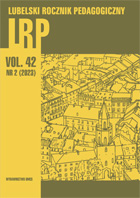MOTYWACJA I ZASPOKOJENIE POTRZEB W PRACY
A WORK-LIFE BALANCE I POCZUCIE SATYSFAKCJI Z ŻYCIA PRACOWNIKÓW POLSKICH KORPORACJI W OKRESIE PRZED PANDEMIĄ COVID-19
MOTIVATION AND MEETING NEEDS AT WORK VS. WORK-LIFE BALANCE AND SENSE OF LIFE SATISFACTION OF EMPLOYEES OF POLISH CORPORATIONS IN THE PERIOD BEFORE THE COVID-19 PANDEMIC
Author(s): Joanna Skrok, Anna Strońska-Szymanek, Marcin Kolemba, Janusz SurzykiewiczSubject(s): Business Economy / Management, Human Resources in Economy, Socio-Economic Research
Published by: Wydawnictwo Naukowe Uniwersytetu Marii Curie-Sklodowskiej
Keywords: work-life balance (WLB); sense of life satisfaction; meeting needs at work; self-determination; motivation regulation; corporate employees;
Summary/Abstract: Introduction: Maintaining a balance between personal and professional life (work-life balance, WLB) is one of the key factors important for the effectiveness of functioning in the professional area and also has a direct impact on the sense of satisfaction with life. The article explores the relationship between motivational factors and needs satisfaction at work and WLB and life satisfaction.Research Aim: The aim of the research was to determine the relationships between the different types of motivation regulation postulated in the theory of self-determination by Deci and Ryan (2000) and the satisfaction of needs at work (autonomy, competence and bonds with other peo- ple) and WLB and the sense of life satisfaction of corporate employees.Method: The study covered 82 employees of five institutions from the financial sector, aged 22 to 62.27 (33%) of the respondents held a managerial position. The following question- naires were used in the study: “Work-Life Balance” (Hill Hawkins, Ferris, Weitzman, 2001), “SWLS” (Juczyński, 2012), Work Extrinsic and Intrinsic Motivation Scale (WEIMS) Tremblay, Blanchard, Taylor, Pelletier, Villeneuvei (2009), and Basic Psychological Need Satisfaction Scale – Work Domain (Deci et al., 2001).Results: Among the respondents, a negative relationship between amotivation – lack of moti- vation to work and WLB was found. The factor that turned out to be positively associated with WLB was the satisfaction of the need of autonomy at work. Positive relationships were also found between intrinsic motivation and life satisfaction, as well as WLB and life satisfaction. Conclusions: The results of the study indicate that it is not so much the specific type of mo- tivation that affects the maintenance of WLB, as the lack of motivation is associated with the disturbance of this balance. The key need that is met at work translates into WLB is the need for autonomy. Our study reported a positive relationship between WLB and life satisfaction. This means that maintaining a work-life balance can be considered as one of the important aspects of well-being.
Journal: Lubelski Rocznik Pedagogiczny
- Issue Year: 42/2023
- Issue No: 2
- Page Range: 195-210
- Page Count: 16
- Language: Polish

